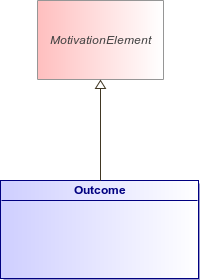
ArchiMate Metamodel
Outcomes are high-level, business-oriented results produced by capabilities of an organization, and by inference by the core elements of its architecture that realize these capabilities.
Outcomes are tangible, possibly quantitative, and time-related, and can be associated with assessments. An outcome may have a different value for different stakeholders.
The notion of outcome is important in business outcome-driven approaches to Enterprise Architecture and in capability-based planning. Outcomes are closely related to requirements, goals, and other intentions. Outcomes are the end results, and goals or requirements are often formulated in terms of outcomes that should be realized. Capabilities are designed to achieve such outcomes.
Outcome names should unambiguously identify end results that have been achieved in order to avoid confusion with actions or goals. At a minimum, outcome names should consist of a noun identifying the end result followed by a past-tense verb or adjective indicating that the result has been achieved. Examples include "First-place ranking achieved" and "Key supplier partnerships in place". Outcome names can also be more specific, e.g. "2015 quarterly profits rose 10% year over year beginning in Q3".
